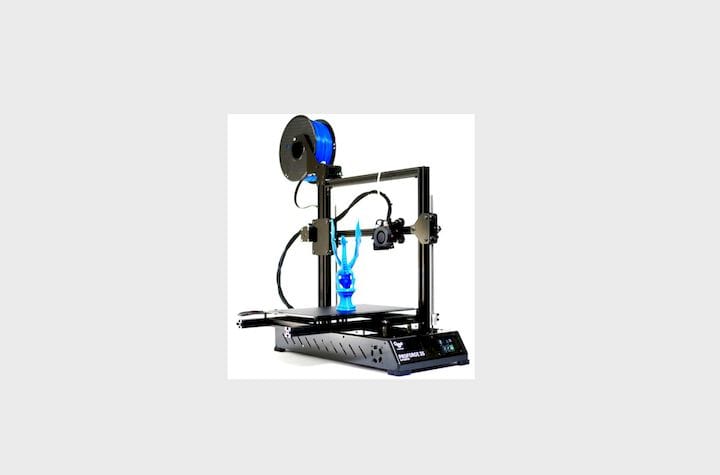![The Proforge 2 Desktop 3D Printer [Source: Makertech 3D]](https://fabbaloo.com/wp-content/uploads/2020/05/Proforge2s-ov2_result_result_img_5eb0a8c0e9391.jpg)
A new 3D printer has appeared on Kickstarter: the Proforge 2 and 2S.
Now, I know what you’re thinking: “another identical 3D printer that will probably fail.” I can’t say much about the fail part, but I can say this device has a very unusual feature that we have not seen before on any other 3D printer.
The two models are identical, aside from the 2S having some key extra features:
- Heated print surface
- Trinamic stepper drivers for silent operation
- Dual Z-axis motors
- Silicone sock for hot end
- Steel nozzle for exotic material printing
![The print surface of the Proforge 2 [Source: Makertech 3D]](https://fabbaloo.com/wp-content/uploads/2020/05/image-asset_img_5eb0a8c170647.jpg)
So let’s focus on the 2S as it’s more interesting. It also includes a number of standard features you’d expect to see on any contemporary desktop 3D printer, such as:
- Minimum layer height of 0.12mm, a bit larger than some, but still quite sufficient for good detail
- Automatic 9-point mesh bed leveling
- Small, but full color touchscreen control panel
- Rigid steel and aluminum structure
- Generous 200 x 300 x 200mm build volume
- Integrated Raspberry Pi Zero for onboard Optional Octoprint use
- Raspberry Pi camera mounted on a swivel arm
- All metal hot end for higher temperature work and abrasive materials like carbon fiber;
- 24V power supply for rapid heat up, especially of the print surface
- Aluminum print surface (which could be layered with something like BuildTak later on)
- Bowden extrusion setup for 1.75mm filaments
But the really interesting feature is the dual extrusion hot end. UK-based Makertech 3D has taken a very unusual approach to the problem of dual extrusion.
The first dual extruders on the market were simply two singles strapped together. There were two main issues. First, the not-in-use extruder tended to bump into raised areas on the print, sometimes knocking the print off the bed and failing the print job. The second major issue was ooze. The not-in-use-but-still-hot extruder tended to drip material, sometimes onto the ongoing print. This obviously fouled the finish on the print, but sometimes caused problem #1 above!
![The unique dual extruder on the Makertech 3D Proforge 2. Note the silicone pads on the left and right to capture ooze [Source: Makertech 3D]](https://fabbaloo.com/wp-content/uploads/2020/05/image-asset_img_5eb0a8c1cda53.jpg)
While some manufacturers opted to solve these problems by using a single nozzle approach in which the filaments are mixed by precisely starting and stopping the two feeder motors, Makertech 3D has a different approach.
Instead they swap out the unused extruder by rotating it around the Y axis slightly. This places the unused nozzle far above the print plane, thus avoiding any unfortunate collisions.
![Schematic of Makertech 3D's solution to the dual extruder problem [Source: Makertech 3D]](https://fabbaloo.com/wp-content/uploads/2020/05/image-asset_img_5eb0a8c229eb5.jpg)
But how did they solve the ooze problem? It’s a remarkably simple solution: they have a silicone pad in place where the unused nozzle slides up against. The pad literally closes the nozzle opening and completely prevents drips. There’s one of these pads on either side of the extruder to handle each respective hot end.
It’s a brilliant solution that I haven’t seen elsewhere. And so ridiculously simple, too. Operation of this setup should be quite rapid, as the single nozzle solutions have to do a purge first to eliminate the “other” material from their chamber before they can resume printing with the new material.
The devices are sold as kits, so you will have to build them yourself. This is likely not an option for a casual 3D printer operator, but instead someone experienced with 3D printers or is handy with mechanical and electronic builds.
For Makertech 3D’s Kickstarter, they’re offering the Proforge 2 at a very low price of £239 (USD$310) and the Proforge 2S at £399 (USD$515), which includes OctoPrint options.
While Makertech 3D has successfully delivered 3D printers previously, it’s always a good idea to review our crowdfunding checklist to see if this is a project for you.
Via Kickstarter and Makertech 3D











FELIXprinters has released a new bioprinter, the FELIX BIOprinter, which is quite a change for the long-time 3D printer manufacturer.